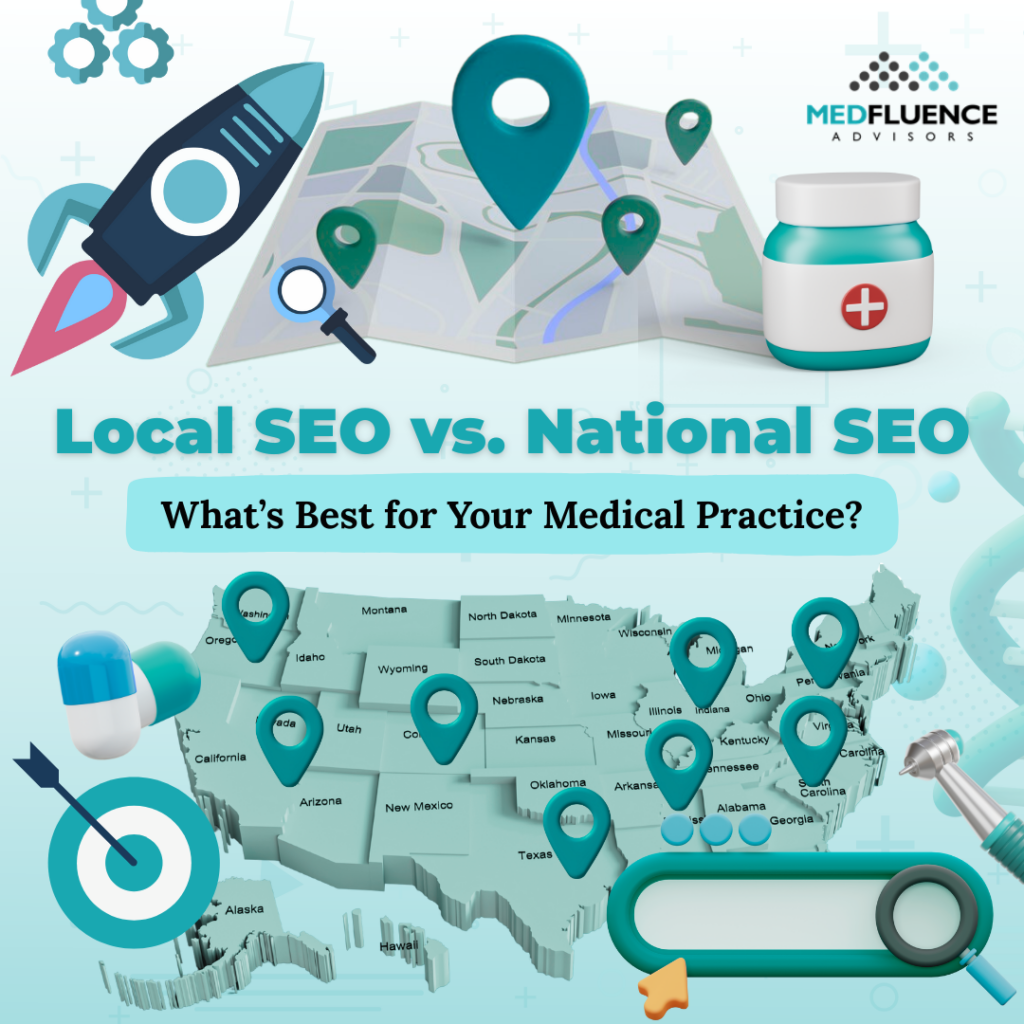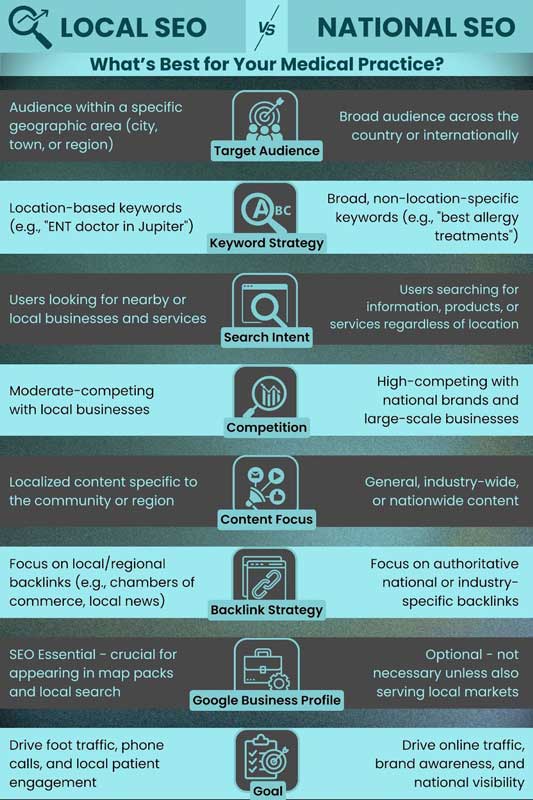Local SEO vs. National SEO: What’s Best for Your Medical Practice?

In today’s digital-first world, building a strong and credible online presence is essential for business success—whether you’re running a large enterprise or a small private practice.
One of the most effective ways to boost your visibility and reputation online is through search engine optimization (SEO). A solid SEO strategy is not just helpful—it’s critical. In the highly competitive and saturated healthcare space, especially for private practices, showing up in search results can mean the difference between gaining a new patient or losing them to a competitor.
As you begin optimizing your website, you’ll encounter two primary strategies: local SEO and national SEO. Both impact how your practice appears in search engine results (SERPs), but each serves a different purpose.
So, which one is right for your practice?
In this guide, we’ll break down the key differences between local and national SEO—helping you identify the right approach to grow your practice and achieve your business goals.
What Is Local SEO?
Local SEO is a digital marketing strategy designed to optimize your business’s online presence to increase visibility in local search results. The goal? To attract more patients or customers in your immediate area—people who are actively searching for services like yours close to home.
In simple terms, local SEO helps connect you with people near your physical location. With the right strategies in place, your practice will show up prominently in search engine results pages (SERPs) when potential patients search for terms like “ENT doctor near me” or “allergist in North Palm Beach.”
For medical practices, local SEO doesn’t just increase website traffic—it drives more foot traffic, builds community trust, and strengthens your reputation as a go-to provider in your area.
Benefits of Local SEO for Medical Practices
- Attract more patients from your local community
- Increase in-person visits and appointment bookings
- Build trust with nearby patients and families
- Boost your authority and credibility in the medical field
- Target specific, high-intent audiences in your area
Who Needs Local SEO?
Local SEO is especially important for any business with a physical location or a service area. This includes:
- Private medical practices and clinics
- Brick-and-mortar businesses (restaurants, salons, gyms)
- Service providers (electricians, HVAC, landscapers)
- Local franchises or branches of national brands
Local searches typically include geographic terms like city names or “near me,” so appearing in those results is key if you want to stay top-of-mind and top-of-search for your community.
What Is National SEO?
National SEO, on the other hand, is all about expanding your reach beyond geographic boundaries. This strategy focuses on helping businesses rank for broader, more competitive keywords—bringing your brand in front of users across the country (or even globally), regardless of location.
For healthcare brands with a multi-location presence, telehealth services, or educational content targeting a national audience, national SEO is essential for scaling reach and increasing visibility at a larger level.
Benefits of National SEO for Medical Practices
- Boost brand awareness and visibility nationwide
- Drive more qualified traffic to your website
- Reach a broader audience beyond your local area
- Increase online leads and service inquiries
- Support business growth, new market expansion, and long-term scalability
Who Needs National SEO?
National SEO is ideal for businesses that are not limited by physical location and can serve customers or patients regardless of geography. These include:
- E-commerce platforms (Amazon, Target, etc.)
- Online education providers (Coursera, Udemy)
- SaaS companies (Shopify, Slack, Trello)
- National healthcare brands or telehealth providers
By understanding the difference between local SEO and national SEO, you can make smarter decisions about how to position your practice online. Whether you’re focused on serving your immediate community or looking to grow on a larger scale, aligning your strategy with your business goals is the key to driving meaningful results.
Local SEO vs. National SEO: The Key Differences
Let’s break down the key differences between local and national SEO:

Local SEO for Your Medical Practice
Now, you might be wondering—which is better for your medical practice: local SEO or national SEO? It’s a valid question, and the answer depends on your goals. Both strategies offer powerful benefits that can fuel business growth and increase revenue.
That said, healthcare is inherently local. For most medical practices, local SEO is the clear winner. It’s designed to help your practice rank higher in search engine results specifically within your community, making it easier for nearby patients to find—and choose—you over competitors.
With the right local SEO strategy, your practice will appear prominently in search results when people in your area are actively looking for the services you offer. This increased visibility not only strengthens your online presence, but also drives more foot traffic, boosts lead conversions, and ultimately leads to greater revenue and long-term success.
Why Medical Practices Need Local SEO
Local SEO has indisputable benefits for medical practices, especially in today’s increasingly digital realm. Here are the reasons why medical practices need to focus on and prioritize local SEO:
- Attract more patients in your local area
Today’s modern patients are smarter and more digital than ever. More often than not, your audience will habitually turn to the internet to look up healthcare services available in their area. This approach to healthcare decisions can be deliberately managed by focusing on local SEO.
Optimizing your business website and published online content will ensure that you tap into the most important demographic for your practice: the people in your area and neighboring communities.
- Increase trust and credibility
Optimizing your practice’s website is key to appearing at the top of local search results. When potential patients in your area search for medical providers and see your practice ranked highly—supported by high-quality content, accurate business listings, and positive reviews—they’ll immediately recognize your practice as reputable and trustworthy. This strong online presence builds confidence and signals that they can expect exceptional care and service.
- Optimize the patient experience
Optimizing for local SEO ensures that you give your audience a streamlined patient experience, starting from their online journey. This includes designing your website with user-friendly navigation, high-quality educational content, and well-organized web pages.
This also creates a positive first impression, improves your audience’s perception of your practice, and encourages them to trust and choose your practice over others who also appear at the top of search results.
- Stand out from the competition
The healthcare industry is highly saturated and fiercely competitive. Practices that prioritize local SEO and optimize for local search are far more likely to stand out. With the right strategies in place, your practice can appear in front of the right audience at the right time—building trust, increasing visibility, and encouraging potential patients to choose you over the competition.
- Boost Patient Volume and Foster Practice Growth
Local SEO drives more patients to your practice by increasing your visibility in local searches. This boost in foot traffic can lead to more appointments, higher patient retention, and ultimately, increased revenue. As your practice grows, so does your presence in the community—helping position you as a trusted healthcare provider and local authority patients rely on for expert care.
The Best Local SEO Strategies for Your Medical Practice

1. Optimize your Google Business Profile
Your practice’s Google Business Profile (GBP) is the cornerstone of local SEO success, especially for private practices. When someone searches for your practice online, your GBP listing appears first. If you rank high on search results, you may appear at the top along with two other businesses – this is known as the local SEO 3-pack.
Ensure complete, accurate, and updated business information
If you haven’t claimed your practice’s GBP listing, make sure to do so as this is one of the first things potential patients see when they look up your practice or healthcare services in your area. Make sure that you provide complete, accurate, and updated information about your business. You will have to provide information such as:
- Business name
- Address
- Contact information (including phone number/s and email address/es)
- Business hours
- Website
- Business category
Make sure that all information is up-to-date, as even small discrepancies can hurt your SEO rankings.
Add high-quality photos and videos
You can showcase your practice’s services and facilities by adding high-quality photos and videos to your GBP listing. This gives potential patients a better sense of your practice and services and what they can expect once they enter your door. Photos and videos can also establish your practice’s legitimacy and improve your ranking in search engines.
Collect and respond to online reviews
Positive reviews from real people can significantly help your practice rank higher in SERPs and, therefore, reach the right audience. Encourage satisfied patients to leave reviews on your GBP listing to boost your rankings and online visibility. You can send links via text messages after the patient’s appointment or display a QR code at your office’s front desk.
Today’s modern patients look at online reviews before they decide on where to get their healthcare needs. When they see that your practice has a lot of positive reviews, they are more likely to trust you and choose your practice over other options.
Don’t forget to respond to online reviews and thank patients for leaving them. Additionally, don’t ignore or remove negative reviews. Instead, respond in a timely and professional manner and offer solutions to their concerns. This will showcase your commitment to providing exceptional and quality service.
Utilize Google posts
Google Posts is a GBP feature that lets businesses share updates, promotions, and events directly on the listing. Utilize this feature to advertise your services and state-of-the-art facilities. This can help attract more people in your community to your practice.
2. Optimize and improve your website
Your business website is often your audience’s first impression of your practice. Improving and optimizing your website for SEO benefits will increase online visibility as well as foot traffic. Make sure that your website meets the following criteria:
- Responsive
- User-friendly design and interface
- Fast loading times
- Visually appealing
- Easy to navigate
- Informative and clear information
Optimize for mobile devices
More and more of your audience is using mobile devices to look up healthcare information and medical providers in their respective areas. Ensure that your business website is optimized for mobile devices. Prioritize designing your website to be mobile-friendly. This includes easy navigation and fast load times, even if they access your website via mobile devices.
3. Use relevant, local keywords
Local keyword search is a critical part of local SEO success. Use relevant, local keywords across your website – including published content, meta tags, page titles, and other elements. Local keywords relevant to your practice will typically include your state, region, city, or any keywords about your location and specialty. Using such relevant local keywords will bring more traffic to your website and bring in more people to your practice.
4. Publish relevant, local content
Localizing your content and ensuring that your published content is relevant to your local community will not only improve your local SEO but will also establish your practice as an authoritative healthcare figure in your community.
Website content and blog posts
Publish health tips, healthcare updates, and local medical news that your local audience will find helpful and relevant. Use location-specific keywords across your content and website pages to further improve your practice’s local SEO.
Social media content
Leverage popular social media platforms like Facebook, Instagram, X (formerly Twitter), TikTok, and LinkedIn to connect with your audience and reach patients. Regularly post engaging content, respond to inquiries, and make sure that you always link back to your business website. Additionally, make sure that the business name, operating hours, and contact information are accurate and consistent across all social media channels.
Video content
Leverage the popularity of video content. Video content is great at capturing the attention and interest of an audience. You can use video content to make important healthcare information interesting and easy to digest. You can also showcase your practice’s facilities and services as well as highlight patient testimonials to increase trust and credibility.
5. Don’t forget to manage local citations and directories
Local citations are mentions of your practice across various online platforms. These platforms include directories, business listings, and review sites. Select relevant directories, including healthcare-specific directories and local directories.
Make sure that your practice’s name, address, and phone number (NAP) are accurate, consistent, and updated across all directories. Any inconsistency or discrepancy is not only confusing to potential patients but will also impact your search engine rankings.
6. Monitor and manage your online reputation
Lastly, it should be part of your digital marketing strategy to regularly monitor and manage your practice’s online reputation. Monitor what your audience is saying about your practice and the services you provide. Respond promptly to any negative reviews or posts. Offer ways to address the issue. This will show your patients and potential patients that you care about and would want to improve their patient experiences.
As part of regularly monitoring your online reputation, take note of what people say about your practice and use that information to make improvements and important business decisions.
Stand Out in a Crowded Healthcare Market
The healthcare industry is becoming more saturated and competitive by the day. Private practices must continuously compete not only with one another but also with large hospital systems for patients’ attention and trust. Local SEO is a powerful tool to elevate your online presence and outshine the competition.
By implementing the right local SEO strategies, your practice can expand its reach, attract more patients, and position itself for long-term growth and success.


